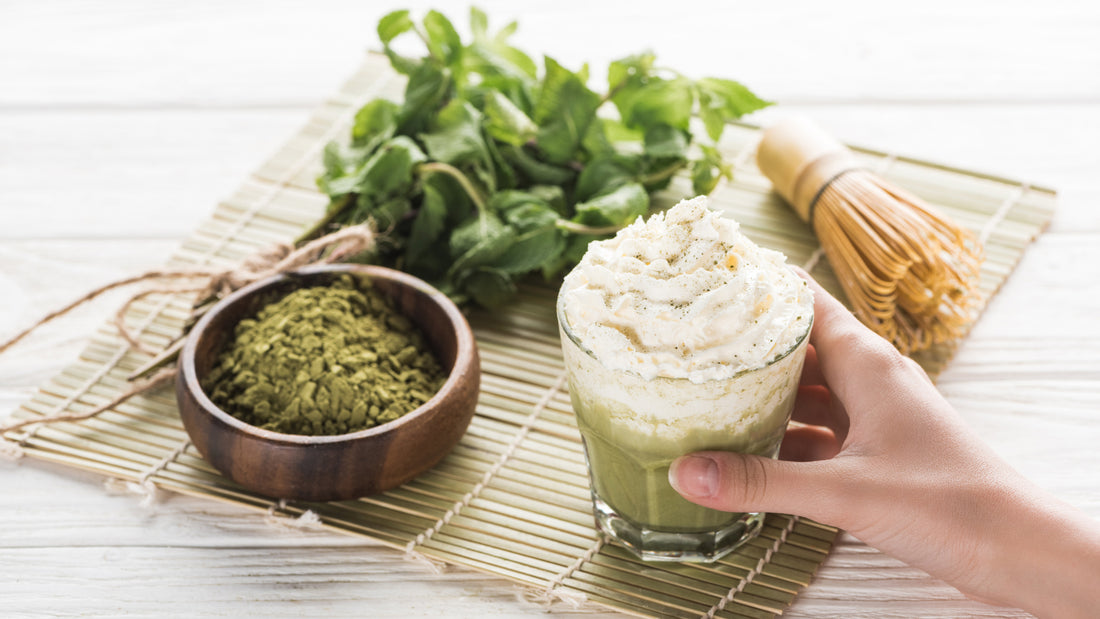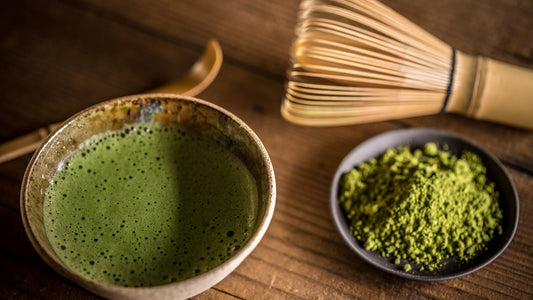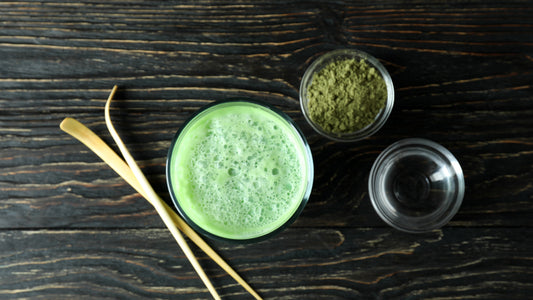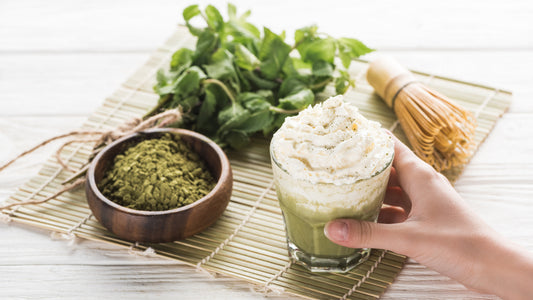Are you someone who has trouble waking up in the morning without having a cup of coffee first? Sadly, you are not alone. A lot of people have a morning caffeine addiction. But the bitter truth is that coffee's stimulating effects come with a price. It can cause anxiety and irritability and leave you uneasy the whole day.
So, do you ever feel that there has to be a better alternative? Well, there is—it's matcha.
The Japanese matcha tea is a vibrant green brew, which is unlike your regular green tea. It has been consumed for centuries due to its unique energizing properties. But does matcha tea contain caffeine? The answer is yes. However, the type and effect of caffeine in matcha differ significantly from that in coffee. Read on to find out a detailed comparison.
What is Matcha Tea?

Matcha tea is a unique, finely ground powder which is made from green tea leaves. The matcha plant known as Camellia sinensis is kept in the dark and grown in the shade, which increases chlorophyll levels that give matcha green tea powder its bright color. The young, tender whole tea leaves are picked and ground into a fine powder that provides a rich, umami and grassy flavor.
Matcha green tea originated in Japan and belongs to the Uji region of Kyoto. It has been used for centuries in Japan for traditional tea ceremonies and medicinal purposes. Matcha was traditionally prepared and served to guests in designated rooms.
Traditionally, it has been made by using special tools called chawan, the tea bowl, chashaku, the scoop, chasen, the tea whisk, and kensui, the hot water container. The traditional preparation process then takes place by measuring matcha with chashaku, whisking it in a zigzag motion with chasen, and finally serving the matcha.
What is Caffeine?

Caffeine is a naturally occurring stimulant that is found in tea leaves, coffee beans, cacao pods, guarana seeds, etc. These plant species are added to drinks like coffee, black tea, soft drinks, and energy drinks to stimulate your brain and nervous system, thus helping you stay alert and energetic.
Caffeine functions by blocking the effects of adenosine, which is a neurotransmitter that relaxes the brain, making you feel relaxed and sleepy. The effects of caffeine also make your brain more active, which then releases dopamine and norepinephrine, thus keeping you alert and awake.
Caffeine in Matcha vs. Coffee: A Comparison
Understanding the caffeine content and its effects in both matcha and coffee can help you make a better choice. Here is a detailed comparison of a cup of matcha and a cup of coffee:
| Feature | Matcha | Coffee |
|---|---|---|
| Caffeine Content | Contains approximately 25-70mg of caffeine per 8oz cup. | Contains approximately 95-200mg of caffeine per 8oz cup. |
| Duration of Effects | The effects of matcha stay longer due to the slower absorption of caffeine. | Due to rapid caffeine absorption, the effects of coffee are short-lived. |
| Jitters and Crash | It rarely causes jitters or energy crashes. | Rapid caffeine absorption commonly causes jitters and energy crashes. |
| Nutritional Content | It is rich in vitamins A, C, K, minerals like zinc, calcium, and fibers. | Besides its antioxidants, coffee has minimal nutritional content. |
| Energy Boost | It promotes a gradual release of energy, encouraging a focused state of mind. | Initial rapid and intense energy boost, but is later followed by a quick decline in energy level. |
Health Benefits of Drinking Matcha
The Japanese green tea matcha is known for its various health benefits and has been used for centuries for the same reason. Here are the key health benefits of drinking matcha:
Protection from Cell Damage
Matcha has antioxidants like catechins and EGCG(epigallocatechin gallate), which protect the body from damage. Catechins are natural antioxidants that prevent cell damage, and EGCG helps fight oxidative stress. EGCG is the most potent catechin in matcha.
Weight Loss
Matcha helps in burning fat more intensely during exercise. Moreover, the catechins present in matcha, mostly EGCG, are also known for enhancing metabolism rates in the body, thus promoting weight loss.
Prevention of Heart Disease
Consuming matcha regularly can help in fighting heart disease. Matcha reduces the levels of bad LDL cholesterol, which lowers the risk of heart disease. Matcha also promotes blood flow and prevents the accumulation of artery plaque.
Blood Pressure Regulation
The antioxidants in matcha improve blood flow by relaxing blood vessels. This can help in lowering blood pressure. It also helps in regulating blood sugar levels and thus prevents extreme fluctuation, which can lead to hypertension.
Enhancing Mental Clarity
The combination of antioxidants and amino acids like L-theanine in matcha can provide mental health benefits. L-theanine is known to stimulate brain wave activity, which enhances focus, mental clarity, and cognitive functionality by providing relaxation
Side Effects and Considerations
Although there are numerous health benefits of matcha, there can be possible side effects. These side effects are mostly rare and aren't too serious, but there must still be some considerations to be followed to ensure safe consumption.
Side Effects
Here are a few side effects of matcha:
1. Impact on sleep
Due to the caffeine content of matcha, it can sometimes affect your sleep patterns or quality. Consuming matcha in large quantities can result in insomnia, restlessness, or disruption in sleep.
2. Blood Pressure Concerns
Matcha is known for its effects on lowering blood pressure. However, people with existing hypertension or heart conditions should use it with caution or in a moderate amount. High levels of matcha can trigger a temporary increase in blood pressure due to caffeine content.
3. Digestive Issues
Consuming matcha on an empty stomach can lead to gastrointestinal problems, like nausea or upset stomach, due to high acidity and caffeine content. The catechins present in matcha can irritate the stomach lining, thus causing irritation or discomfort.
4. Iron Absorption
The catechins present in matcha can interfere with the absorption of iron through plant-based food. This can lead to iron deficiency in some individuals and thus cause fatigue, weakness, and other symptoms of iron deficiency.
Considerations
1. Consumption timings
Since matcha can cause sleep disturbances, avoid consuming matcha at night and take a matcha latte early in the morning to have maximum benefits. Similarly, take matcha after or in between your meals to reduce digestive issues.
2. Hydrate
The caffeine content of matcha can increase urine production; therefore, to avoid dehydration, you must drink adequate amounts of water. Moreover, the high catechin amount in matcha can also cause dehydration if there are not enough fluids.
3. Choose high-quality matcha
Always look for trusted brands while buying matcha. Make sure that they are not only of high quality but are also tested in third-party labs for your safety. Moreover, look for customer reviews and ratings to get the best products.
4. Recommended amount for daily consumption
Enjoying the benefits of matcha while maintaining safety can also depend on the serving sizes and caffeine intake. Most adults are recommended not to consume more than 400mg of caffeine per day.
One scoop of matcha typically contains 30 to 40 mg of caffeine. Therefore, it is okay to consume matcha tea 1 to 2 times a day, which can also be safe and effective.
Conclusion
Hopefully, now you know that matcha is not just any green tea and is a much healthier alternative to coffee. So say goodbye to your coffee dependence, and create your own motto, “Matcha is my morning essential!”.
However, when it comes to buying matcha tea, you should always look for them on trusted websites like Mush Mouth. Their third-party lab-tested matcha powder is made with ceremonial grade matcha and has the benefits of 6 different organic products. Moreover, their FDA-inspected facilities ensure the safety of all their customers by providing pure and potent products.
FAQs - Frequently Asked Questions
Q1. Will matcha keep me awake?
Matcha has a moderate amount of caffeine present in it, which can help increase alertness and awareness. However, the amino acids present in it help in relaxation, thus balancing the effects. However, taking higher doses of matcha can help in keeping you awake.
Q2. Is matcha better than coffee for anxiety?
The L-theanine content of matcha can help reduce anxiety and promote relaxation. However, due to the high caffeine levels of coffee and sudden energy changes, coffee can worsen anxiety.
Q3. Can I drink matcha every morning?
Yes, matcha can be great for consuming every morning. Its caffeine content can keep you alert and energized the whole day, and its L-theanine content will keep your mind relaxed and clear and ready to do your work with efficiency.




